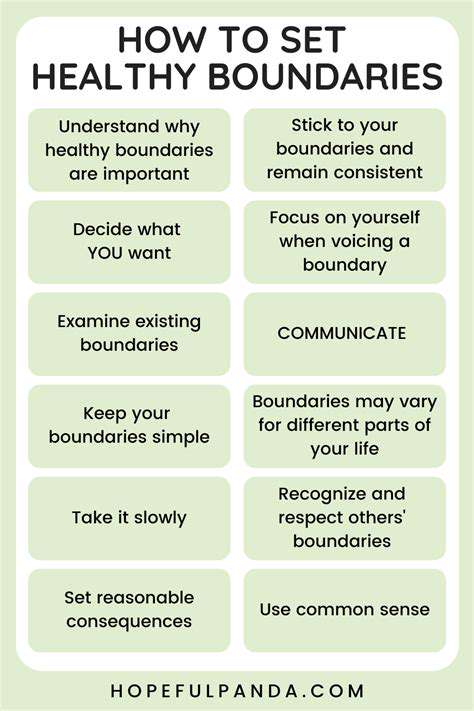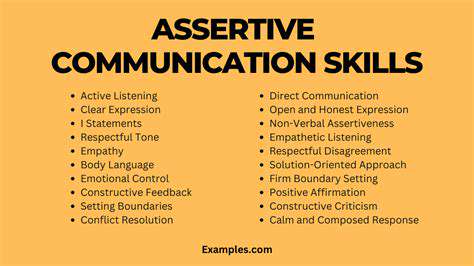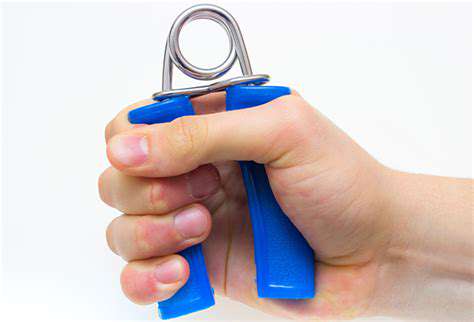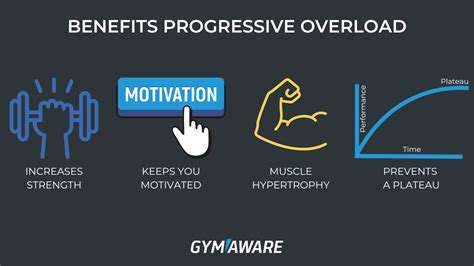How to Build a Habit of Saying No


Practicing Self-Compassion and Persistence
Understanding the Importance of Self-Compassion
Self-compassion is crucial when navigating the challenges of saying no. It involves treating yourself with kindness and understanding, especially when you feel overwhelmed or disappointed by the demands placed upon you. This doesn't mean being lenient with yourself in a way that hinders progress, but rather acknowledging the inherent difficulties in setting boundaries and maintaining them. When you practice self-compassion, you're more likely to approach the process of saying no with a gentler and more supportive inner dialogue, reducing the likelihood of self-criticism and fostering a healthier approach to personal well-being.
Recognizing that everyone faces setbacks and struggles in the process of building healthy boundaries is a key component of self-compassion. It allows you to accept that saying no sometimes feels difficult and that's okay. This acceptance is essential for long-term success in establishing a habit of saying no.
Identifying Your Limits and Needs
A vital step in practicing self-compassion and persistence in saying no is understanding your own limits and needs. This involves honestly assessing your capacity for taking on new commitments, recognizing the impact those commitments will have on your well-being, and prioritizing your own needs and well-being.
Understanding your personal limits and needs is paramount to saying no effectively. This isn't about being selfish, but rather about valuing your time, energy, and mental health. When you prioritize your well-being, you create space for fulfilling commitments that genuinely align with your values and goals.
Developing a No Script
Having a clear and concise no script can significantly ease the process of declining requests. This script should be brief, respectful, and assertive, allowing you to politely but firmly communicate your boundaries without feeling apologetic or defensive.
Practicing Assertiveness
Building a habit of saying no requires developing assertiveness skills. Assertiveness is about expressing your needs and opinions clearly and respectfully, without being aggressive or passive. This involves practicing clear communication, both verbally and nonverbally. It's about learning to stand your ground while maintaining a respectful tone and approach. Consistent practice will build your confidence and enable you to effectively communicate your boundaries.
Overcoming Fear and Guilt
Often, the fear of disappointing others or the feeling of guilt associated with saying no can significantly hinder the process of building a habit of saying no. Addressing these fears and anxieties is a crucial aspect of developing self-compassion and persistence in setting boundaries. It's important to recognize that saying no doesn't make you a bad person, and that your well-being is equally as important as the needs of others.
Challenging negative thought patterns and replacing them with more positive and supportive self-talk is a vital component in overcoming the fear of disappointing others and the guilt associated with saying no. Identifying the root causes of these feelings and actively addressing them with self-compassion will significantly strengthen your ability to persist in setting healthy boundaries.
Persistence and Patience
Building a habit of saying no takes time and consistent effort. It's not a skill that's mastered overnight, and there will be setbacks along the way. Be patient with yourself, celebrate small victories, and remain committed to the process. Persistence is key to overcoming obstacles and ultimately establishing a sustainable practice of saying no.
Remember that progress, not perfection, is the goal. Expect some challenges and adjust your approach as needed. The journey toward saying no effectively is one of continuous learning and growth. With consistent practice, you will develop a stronger sense of self and the confidence to protect your well-being while honoring the commitments that truly matter to you.
Read more about How to Build a Habit of Saying No
Hot Recommendations
-
*Guide to Managing Gout Through Diet
-
*Best Habits for Financial Well being
-
*How to Build a Routine for Better Mental Health
-
*How to Eat Healthy on a Budget [Tips & Meal Ideas]
-
*Guide to Practicing Self Acceptance
-
*How to Incorporate More Movement Into Your Day
-
*Guide to Managing Chronic Pain Naturally
-
*Guide to Building a Reading Habit for Well being
-
*Top 5 Weight Loss Supplements That Actually Work
-
*Best Exercises for Postpartum Recovery [Beyond Abdominal Work]











